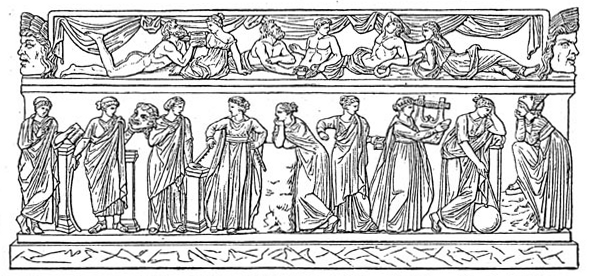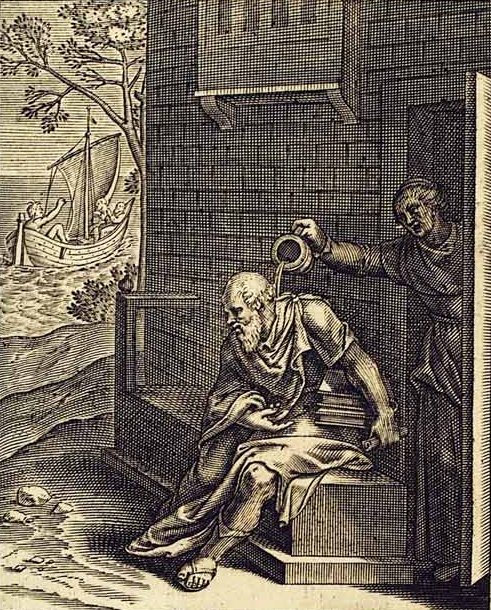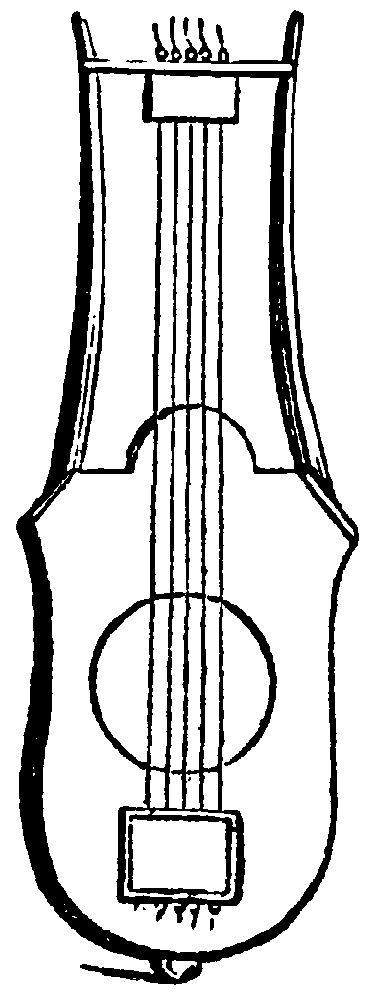|
Lyric Poem
Modern lyric poetry is a formal type of poetry which expresses personal emotions or feelings, typically spoken in the first person. It is not equivalent to song lyrics, though song lyrics are often in the lyric mode, and it is also ''not'' equivalent to Ancient Greek lyric poetry, which ''was'' principally limited song lyrics, or chanted verse, hence the confusion. The term for both modern lyric poetry and modern song lyrics both derive from a form of Ancient Greek literature, the Greek lyric, which was defined by its musical accompaniment, usually on a stringed instrument known as a kithara. The term owes its importance in literary theory to the division developed by Aristotle among three broad categories of poetry: lyrical, dramatic, and epic. Lyric poetry is also one of the earliest forms of literature. Meters Much lyric poetry depends on regular meter based either on number of syllables or on stress – with two short syllables typically being exchangeable for one long ... [...More Info...] [...Related Items...] OR: [Wikipedia] [Google] [Baidu] |
Dactyl (poetry)
A dactyl (; el, δάκτυλος, ''dáktylos'', “finger”) is a foot in poetic meter. In quantitative verse, often used in Greek or Latin, a dactyl is a long syllable followed by two short syllables, as determined by syllable weight. The best-known use of dactylic verse is in the epics attributed to the Greek poet Homer, the Iliad and the Odyssey. In accentual verse, often used in English, a dactyl is a stressed syllable followed by two unstressed syllables—the opposite is the anapaest (two unstressed followed by a stressed syllable). An example of dactylic meter is the first line of Henry Wadsworth Longfellow's epic poem ''Evangeline'' (1847), which is in dactylic hexameter: :''This is the / forest prim- / eval. The / murmuring / pines and the / hemlocks, The first five feet of the line are dactyls; the sixth a trochee. Stephen Fry quotes Robert Browning's poem " The Lost Leader" as an example of the use of dactylic metre to great effect, creating verse with "great rhy ... [...More Info...] [...Related Items...] OR: [Wikipedia] [Google] [Baidu] |
Nine Lyric Poets
The Nine Lyric or Melic Poets were a canonical group of ancient Greek poets esteemed by the scholars of Hellenistic Alexandria as worthy of critical study. In the Palatine Anthology it is said that they established lyric song. They were: *Alcman of Sparta (choral lyric, 7th century BC) *Sappho of Lesbos (monodic lyric, BC) *Alcaeus of Mytilene (monodic lyric, BC) *Anacreon of Teos (monodic lyric, 6th century BC) *Stesichorus of Metauros (choral lyric, 7th century BC) *Ibycus of Rhegium (choral lyric, 6th century BC) *Simonides of Ceos (choral lyric, 6th century BC) *Bacchylides of Ceos (choral lyric, 5th century BC) *Pindar of Thebes (choral lyric, 5th century BC) In most Greek sources the word ''melikos'' (from ''melos'', "song") is used to refer to these poets, but the variant ''lyrikos'' (from ''lyra'', "lyre") became the regular form in both Latin (as ''lyricus'') and in modern languages. The ancient scholars defined the genre on the basis of the musical accompaniment, not t ... [...More Info...] [...Related Items...] OR: [Wikipedia] [Google] [Baidu] |
Alexandria
Alexandria ( or ; ar, ٱلْإِسْكَنْدَرِيَّةُ ; grc-gre, Αλεξάνδρεια, Alexándria) is the second largest city in Egypt, and the largest city on the Mediterranean coast. Founded in by Alexander the Great, Alexandria grew rapidly and became a major centre of Hellenic civilisation, eventually replacing Memphis, in present-day Greater Cairo, as Egypt's capital. During the Hellenistic period, it was home to the Lighthouse of Alexandria, which ranked among the Seven Wonders of the Ancient World, as well as the storied Library of Alexandria. Today, the library is reincarnated in the disc-shaped, ultramodern Bibliotheca Alexandrina. Its 15th-century seafront Qaitbay Citadel is now a museum. Called the "Bride of the Mediterranean" by locals, Alexandria is a popular tourist destination and an important industrial centre due to its natural gas and oil pipelines from Suez. The city extends about along the northern coast of Egypt, and is the largest city on t ... [...More Info...] [...Related Items...] OR: [Wikipedia] [Google] [Baidu] |
Hellenistic
In Classical antiquity, the Hellenistic period covers the time in Mediterranean history after Classical Greece, between the death of Alexander the Great in 323 BC and the emergence of the Roman Empire, as signified by the Battle of Actium in 31 BC and the conquest of Ptolemaic Egypt the following year. The Ancient Greek word ''Hellas'' (, ''Hellás'') was gradually recognized as the name for Greece, from which the word ''Hellenistic'' was derived. "Hellenistic" is distinguished from "Hellenic" in that the latter refers to Greece itself, while the former encompasses all ancient territories under Greek influence, in particular the East after the conquests of Alexander the Great. After the Macedonian invasion of the Achaemenid Empire in 330 BC and its disintegration shortly after, the Hellenistic kingdoms were established throughout south-west Asia ( Seleucid Empire, Kingdom of Pergamon), north-east Africa ( Ptolemaic Kingdom) and South Asia ( Greco-Bactrian Kingdom, Indo-Gree ... [...More Info...] [...Related Items...] OR: [Wikipedia] [Google] [Baidu] |
Oxford, England
Oxford () is a city in England. It is the county town and only city of Oxfordshire. In 2020, its population was estimated at 151,584. It is north-west of London, south-east of Birmingham and north-east of Bristol. The city is home to the University of Oxford, the oldest university in the English-speaking world; it has buildings in every style of English architecture since late Anglo-Saxon. Oxford's industries include motor manufacturing, education, publishing, information technology and science. History The history of Oxford in England dates back to its original settlement in the Saxon period. Originally of strategic significance due to its controlling location on the upper reaches of the River Thames at its junction with the River Cherwell, the town grew in national importance during the early Norman period, and in the late 12th century became home to the fledgling University of Oxford. The city was besieged during The Anarchy in 1142. The university rose to dominate ... [...More Info...] [...Related Items...] OR: [Wikipedia] [Google] [Baidu] |
Elegy
An elegy is a poem of serious reflection, and in English literature usually a lament for the dead. However, according to ''The Oxford Handbook of the Elegy'', "for all of its pervasiveness ... the 'elegy' remains remarkably ill defined: sometimes used as a catch-all to denominate texts of a somber or pessimistic tone, sometimes as a marker for textual monumentalizing, and sometimes strictly as a sign of a lament for the dead". History The Greek term ἐλεγείᾱ (''elegeíā''; from , , ‘lament’) originally referred to any verse written in elegiac couplets and covering a wide range of subject matter (death, love, war). The term also included epitaphs, sad and mournful songs, and commemorative verses. The Latin elegy of ancient Roman literature was most often erotic or mythological in nature. Because of its structural potential for rhetorical effects, the elegiac couplet was also used by both Greek and Roman poets for witty, humorous, and satirical subject matter. Oth ... [...More Info...] [...Related Items...] OR: [Wikipedia] [Google] [Baidu] |
Iambus (genre)
Iambus or iambic poetry was a genre of ancient Greek poetry that included but was not restricted to the iambic meter and whose origins modern scholars have traced to the cults of Demeter and Dionysus. The genre featured insulting and obscene language and sometimes it is referred to as "blame poetry". For Alexandrian editors, however, iambus signified any poetry of an informal kind that was intended to entertain, and it seems to have been performed on similar occasions as elegy even though lacking elegy's decorum. The Archaic Greek poets Archilochus, Semonides and Hipponax were among the most famous of its early exponents. The Alexandrian poet Callimachus composed "iambic" poems against contemporary scholars, which were collected in an edition of about a thousand lines, of which fragments of thirteen poems survive. He in turn influenced Roman poets such as Catullus, who composed satirical epigrams that popularized Hipponax's choliamb. Horace's '' Epodes'' on the other hand were ... [...More Info...] [...Related Items...] OR: [Wikipedia] [Google] [Baidu] |
Trochaic
In English poetic metre and modern linguistics, a trochee () is a metrical foot consisting of a stressed syllable followed by an unstressed one. But in Latin and Ancient Greek poetic metre, a trochee is a heavy syllable followed by a light one (also described as a long syllable followed by a short one). In this respect, a trochee is the reverse of an iamb. Thus the Latin word "there", because of its short-long rhythm, in Latin metrical studies is considered to be an iamb, but since it is stressed on the first syllable, in modern linguistics it is considered to be a trochee. The adjective form is ''trochaic''. The English word ''trochee'' is itself trochaic since it is composed of the stressed syllable followed by the unstressed syllable . Another name formerly used for a trochee was a choree (), or choreus. Etymology ''Trochee'' comes from French , adapted from Latin , originally from the Greek (), 'wheel', from the phrase (), literally 'running foot'; it is connected with ... [...More Info...] [...Related Items...] OR: [Wikipedia] [Google] [Baidu] |
Barbitos
The barbiton, or barbitos ( Gr: βάρβιτον or βάρβιτος; Lat. ''barbitus''), is an ancient stringed instrument related to the lyre known from Greek and Roman classics. The Greek instrument was a bass version of the kithara, and belonged in the zither family, but in medieval times, the same name was used to refer to the '' barbat'' a different instrument that is a variety of lute. Error in the use of names The barbat or ''barbud'', began being translated into Latin as ''barbiton'' sometime during the late Middle Ages, a mistaken practice which has passed into English and other European languages through long misuse. The barbat is an unrelated lute-family instrument developed in Persia, whereas the barbiton (a bass kithara) was developed in Greek-speaking western Anatolia, where it was popular, and spread into the rest of the Aegean. ::Throughout this article ''barbiton'' refers ''only'' to the Anatolian / Aegean instrument, and ''barbat'' is the ''only'' nam ... [...More Info...] [...Related Items...] OR: [Wikipedia] [Google] [Baidu] |
Cithara
The kithara (or Latinized cithara) ( el, κιθάρα, translit=kithāra, lat, cithara) was an ancient Greek musical instrument in the yoke lutes family. In modern Greek the word ''kithara'' has come to mean "guitar", a word which etymologically stems from ''kithara''. The cithara was a seven-stringed professional version of the lyre, which was regarded as a rustic, or folk instrument, appropriate for teaching music to beginners. As opposed to the simpler lyre, the cithara was primarily used by professional musicians, called kitharodes. The cithara's origins are likely Anatolian. popular in the eastern Aegean and ancient Anatolia. Uses Whereas the basic lyra was widely used as a teaching instrument in boys’ schools, the cithara was a virtuoso's instrument, generally known as requiring a great deal of skill. The cithara was played primarily to accompany dance, epic recitations, rhapsodies, odes, and lyric songs. It was also played solo at the receptions, ban ... [...More Info...] [...Related Items...] OR: [Wikipedia] [Google] [Baidu] |
Ancient Greeks
Ancient Greece ( el, Ἑλλάς, Hellás) was a northeastern Mediterranean civilization, existing from the Greek Dark Ages of the 12th–9th centuries BC to the end of classical antiquity ( AD 600), that comprised a loose collection of culturally and linguistically related city-states and other territories. Most of these regions were officially unified only once, for 13 years, under Alexander the Great's empire from 336 to 323 BC (though this excludes a number of Greek city-states free from Alexander's jurisdiction in the western Mediterranean, around the Black Sea, Cyprus, and Cyrenaica). In Western history, the era of classical antiquity was immediately followed by the Early Middle Ages and the Byzantine period. Roughly three centuries after the Late Bronze Age collapse of Mycenaean Greece, Greek urban poleis began to form in the 8th century BC, ushering in the Archaic period and the colonization of the Mediterranean Basin. This was followed by the age of Classical Gree ... [...More Info...] [...Related Items...] OR: [Wikipedia] [Google] [Baidu] |







.jpg)